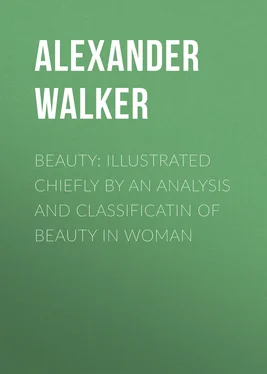Alexander Walker - Beauty - Illustrated Chiefly by an Analysis and Classificatin of Beauty in Woman
Здесь есть возможность читать онлайн «Alexander Walker - Beauty - Illustrated Chiefly by an Analysis and Classificatin of Beauty in Woman» — ознакомительный отрывок электронной книги совершенно бесплатно, а после прочтения отрывка купить полную версию. В некоторых случаях можно слушать аудио, скачать через торрент в формате fb2 и присутствует краткое содержание. Жанр: foreign_antique, foreign_home, psy_sex_and_family, на английском языке. Описание произведения, (предисловие) а так же отзывы посетителей доступны на портале библиотеки ЛибКат.
- Название:Beauty: Illustrated Chiefly by an Analysis and Classificatin of Beauty in Woman
- Автор:
- Жанр:
- Год:неизвестен
- ISBN:нет данных
- Рейтинг книги:5 / 5. Голосов: 1
-
Избранное:Добавить в избранное
- Отзывы:
-
Ваша оценка:
- 100
- 1
- 2
- 3
- 4
- 5
Beauty: Illustrated Chiefly by an Analysis and Classificatin of Beauty in Woman: краткое содержание, описание и аннотация
Предлагаем к чтению аннотацию, описание, краткое содержание или предисловие (зависит от того, что написал сам автор книги «Beauty: Illustrated Chiefly by an Analysis and Classificatin of Beauty in Woman»). Если вы не нашли необходимую информацию о книге — напишите в комментариях, мы постараемся отыскать её.
Beauty: Illustrated Chiefly by an Analysis and Classificatin of Beauty in Woman — читать онлайн ознакомительный отрывок
Ниже представлен текст книги, разбитый по страницам. Система сохранения места последней прочитанной страницы, позволяет с удобством читать онлайн бесплатно книгу «Beauty: Illustrated Chiefly by an Analysis and Classificatin of Beauty in Woman», без необходимости каждый раз заново искать на чём Вы остановились. Поставьте закладку, и сможете в любой момент перейти на страницу, на которой закончили чтение.
Интервал:
Закладка:
In colder or more uncertain climates, the greatest degree of covering constitutes the greatest degree of artificial decency: fashion and decency are confounded. Among old-fashioned people, of whom a good example may be found in old countrywomen of the middle class in England, it is indecent to be seen with the head unclothed; such a woman is terrified at the chance of being seen in that condition; and if intruded on at such a time, she shrieks with terror and flies to conceal herself. In the equally polished dandy of the metropolis, it is indecent to be seen without gloves. Which of these respectable creatures is the most enlightened, I do not take upon me to say; but I believe that the majority of suffrages would be in favor of the old woman.
So entirely are these decencies artificial, that any number of them may easily be created, not merely with regard to man or woman, but even with regard to domesticated animals. If it should please some persons partially to clothe horses, cows, or dogs, it would ere long be felt that their appearing in the streets without trowsers or aprons was grossly indecent. We might thus create a real feeling of indecency, the perception of a new impurity, which would take the place of the former absence of all impure thought, and once established, the evil would be as real as our whims have made it in other respects.
Moral feeling is deeply injured by this substitution of impure thoughts, however fancifully founded, for pure ones, or rather for the entire absence of thought about worthless things. Artificial crimes are thus made, which are not the less real because artificial; for if aught of this kind is believed to be right, there is weakness or wrong in its violation. But violated it must be, if it were but accidentally.
To corrupt minds, this very violation of artificial decency in the case of woman affords the zest for the sake of which many of these decencies seem to have been instituted; and thus are created the artful decencies.
The purpose and the zest of artful decency are well illustrated by coquetry. Coquetry adopts a general concealment, which it well knows can alone give a sensual and seductive power to momentary exposure. Coquetry eschews permanent exposure as the bane of sensuality and seduction; and where these are great, as among the women of Spain, the concealment of dress is increased, even in warm climates. Nothing can throw greater light than this does on the nature of these decencies.
That coquetry has well calculated her procedure, does not admit of a doubt. She appeals to imagination, which she knows will spread charms over even ugly forms; she seeks the concealment under which sensuality and lust are engendered; and, in marriage, she at last lifts the veil which gratifies, only to disgust, and repays a sensual hallucination by years of misery.
Ought religion to claim the right of saying grace to such unveiling of concealment and the nuptial rites that follow it? Ought religion to profit by the impurities of sexual association? Marriage is a civil ceremony in other countries, even in Scotland. Such profane and profitable sanctions have nothing to do with primitive Christianity: they are abhorrent to its letter as well as to its spirit. But worldly and profitable religion is connected in business with government, under the firm of Church and State, and drives a thriving trade, in which the junior partner is contented with the profit arising from the common acts of life, while the senior one draws much of his living from other rites. 2 2 I do not wish to be forced into any discussion of this last point. But, if necessary, I shall not decline it.
What is said here, is no argument for living nudity: that, our climate and our customs forbid; and, in so doing, we can only regret that they are unfavorable to natural purity; while perfect familiarity with the figure ensures that feeling in the highest degree.
A distinguished artist informs me that greater modesty is nowhere to be seen than at the Life academy; and it was an observation of the great Flaxman, that “the students, in entering the academy, seemed to hang up their passions with their hats.” I can, from personal experience, give the same testimony in behalf of medical students at the dissecting-rooms. The familiarity of both these classes with natural beauty leads them only to seek to inform their minds and to purify their taste. 3 3 We fear that Mr. Walker’s analogical reasoning here is not very conclusive. To reason from a living to a dead subject may be very logical but it is not altogether satisfactory.
Sinibaldi observes, that “nothing is more injurious to morals and to health, than the incitements of the women who in such numbers walk our streets,” and that “the laws as to offences against morals ought certainly to affect them the moment their language or actions can be deemed offensive.” But it is not to those who are critically conversant with the highest beauty of the human figure, that defective forms, ill-painted skins, rude manners, and contagious diseases, are at all seductive.
Nothing, then, can be more favorable to virtue than the decoration of every house with the beautiful copies of the glorious works of ancient Greece; and it is only humiliating to think that what has been so extensively done in this respect in the best houses, is less owing to our own taste than to the poor wanderers from Lucca or Barga. Experiment on this subject is peculiarly easy in London: let any one spend an hour in the shop of the very able Mr. Sarti, of Dean street, where he will meet the most liberal attention, and let him ask himself, in coming out, whether his moral feeling, as well as his taste, is not improved.
Those who cannot make this experiment, will perhaps be satisfied with the assurance of Hogarth, who says: “The rest of the body, not having advantages in common with the face, would soon satiate the eye, were it to be as constantly exposed, nor would it have more effect than a marble statue.” Surely this is decisive enough in its way! Now let them mark what follows. “But,” he continues, “when it is artfully clothed and decorated, the mind at every turn resumes its imaginary pursuits concerning it. Thus, if I may be allowed a simile, the angler chooses not to see the fish he angles for, until it is fairly caught.” He meant of course—“the fish chooses not to see the angler , until it is fairly caught!”
Be it known then to all, even the most aristocratic as to sexual association—I say the most aristocratic, and not the most religious, because religion is in some countries made the pander to aristocracy—be it known that the critical judgment and pure taste for beauty are the sole protection against low and degrading connexions.
Home observes that “the sense of beauty does not tend to advance the interests of society, but when in a due mean with respect to strength. Love in particular arising from a sense of beauty, loses, when excessive, its sociable character: the appetite for gratification, prevailing over affection for the beloved object, is ungovernable, and tends violently to its end, regardless of the misery that must follow. Love in this state is no longer a sweet agreeable passion: it becomes painful, like hunger or thirst, and produces no happiness but in the instant of fruition. This discovery suggests a most important lesson, that moderation in our desires and appetites, which fits us for doing our duty, contributes at the same time the most to happiness: even social passions, when moderate, are more pleasant than when they swell beyond proper bounds.” Payne Knight says: “When, at the age of puberty, animal desire obtrudes itself on a mind already qualified to feel and enjoy the charms of intellectual merit, the imagination immediately begins to form pictures of perfection, by exaggerating and combining in one hypothetic object every excellence that can possibly belong to the whole sex; and the first individual that meets the eye, with any exterior signs of any of these ideal excellences, is immediately decorated with them all, by the creative magic of a vigorous and fertile fancy. Hence, she instantaneously becomes the object of the most fervent affection, which is as instantaneously cooled by possession: for, as it was not the object herself, but a false idea of her raised in heated imagination, that called forth all the lover’s raptures, all immediately vanish at the detection of his delusion; and a degree of disgust proportioned to the disappointment, of which it is the inevitable consequence, instantly succeeds. Thus it happens that what are called love-matches are seldom or ever happy.”
Читать дальшеИнтервал:
Закладка:
Похожие книги на «Beauty: Illustrated Chiefly by an Analysis and Classificatin of Beauty in Woman»
Представляем Вашему вниманию похожие книги на «Beauty: Illustrated Chiefly by an Analysis and Classificatin of Beauty in Woman» списком для выбора. Мы отобрали схожую по названию и смыслу литературу в надежде предоставить читателям больше вариантов отыскать новые, интересные, ещё непрочитанные произведения.
Обсуждение, отзывы о книге «Beauty: Illustrated Chiefly by an Analysis and Classificatin of Beauty in Woman» и просто собственные мнения читателей. Оставьте ваши комментарии, напишите, что Вы думаете о произведении, его смысле или главных героях. Укажите что конкретно понравилось, а что нет, и почему Вы так считаете.












